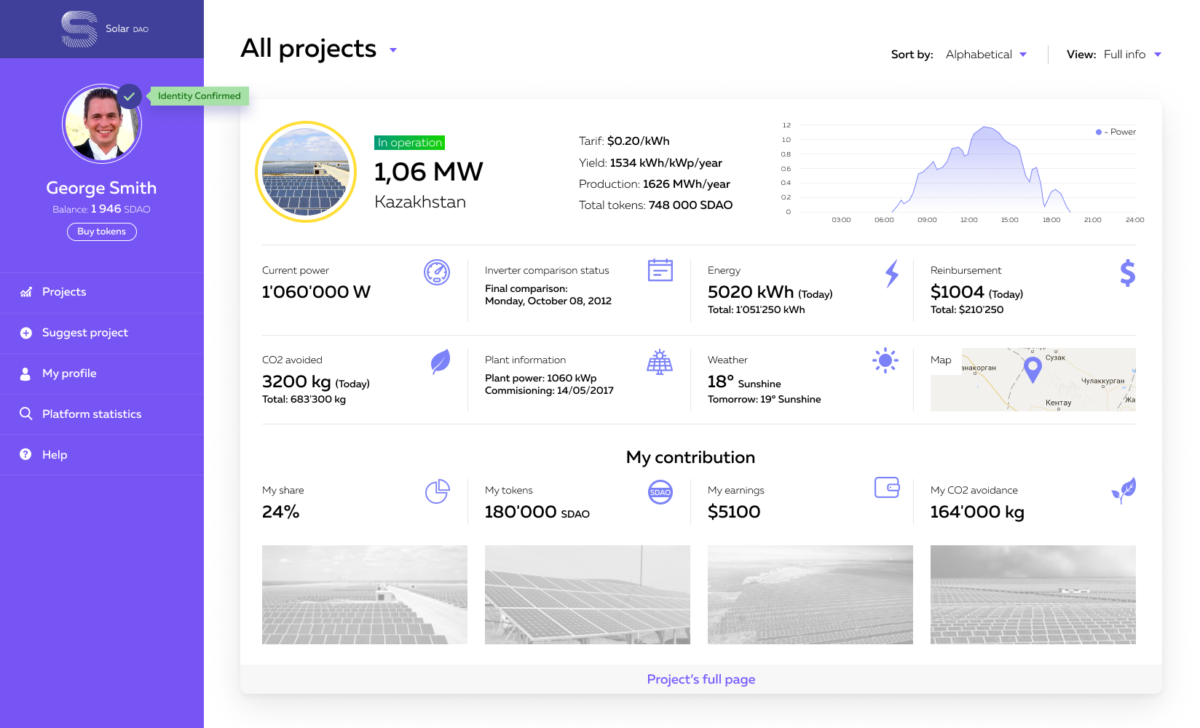While a great number of blockchain endeavors in the solar arena focus on already established power generation systems and distribution networks, only a handful of projects so far look to both optimize and expand the market by engaging new investors.
Russian blockchain project, Solar DAO is enabling people with budgets as modest as $1 to become co-owners of solar projects. It is based on a crowdfunding model, which allows users to finance the construction of solar PV plants around the world, circumventing technical and other barriers.
With an established project pipeline, Solar DAO is now looking to solidify its foothold in the solar market through a partnership with Estonian blockchain project, Powerchain, a decentralized network for energy storage.
In addition to promoting renewables, the partnership aims at connecting Solar DAO plants to the Powerchain network of distributed batteries.
The Powerchain platform is based on an energy storage as a service business model. It is open to any individual or company, which can assume any role in the system, ranging from generators, storage capacity providers to consumers, or act simultaneously in several roles (for example, storage members can also have a system installed to generate electricity).
The Powerchain network is built on the equipment of platform users and open to any type of storage systems. All potential users that add their storage systems to the network will in return gain a certain number of POWEC tokens, depending on the size and type of the battery.
Although at a very early stage, the project has already announced its partnership with flywheel energy storage supplier, Kinetic, which is providing its systems to the network.
Powerchain plans to launch its platform in Germany, and spread it across stages to Europe, Asia, and Latin America. The size of its network will depend on the sale of its POWEC tokens, which will begin with the initial coin offering scheduled for the second quarter of 2019.
The ultimate goal is to connect Solar DAO power stations with Powerchain’s batteries, as well as to make SDAO tokens more attractive by providing the token holders with bonuses from Powerchain, most likely POWEC tokens.
In the short run, Solar DAO plans to launch a new platform within its own project, which will be open to anyone who wants to suggest potential land plots for the construction of Solar DAO power plants. The platform users will be able to vote for proposed land plots, previously shortlisted and approved by the Solar DAO team. Once the facility is built, the reward will be delivered in the form of SDAO tokens.
Solar DAO has no finished PV projects yet. It is currently working on its first solar PV project: 8 MW solar array in Kazakhstan, divided into two phases – 4 MW in the north-west of the country and 4 MW in the south.
After raising enough funds, Solar DAO took part in tariff bidding under the Kazakh new auction scheme earlier this year, but with no success. It has thus decided to participate in the next Kazakh tender scheduled for October 2018.
In addition, Solar DAO says it has obtained land for a 1 MW solar PV project in Portugal, while it is also working on buying projects in Iran and studying opportunities in Armenia.
This content is protected by copyright and may not be reused. If you want to cooperate with us and would like to reuse some of our content, please contact: editors@pv-magazine.com.




By submitting this form you agree to pv magazine using your data for the purposes of publishing your comment.
Your personal data will only be disclosed or otherwise transmitted to third parties for the purposes of spam filtering or if this is necessary for technical maintenance of the website. Any other transfer to third parties will not take place unless this is justified on the basis of applicable data protection regulations or if pv magazine is legally obliged to do so.
You may revoke this consent at any time with effect for the future, in which case your personal data will be deleted immediately. Otherwise, your data will be deleted if pv magazine has processed your request or the purpose of data storage is fulfilled.
Further information on data privacy can be found in our Data Protection Policy.